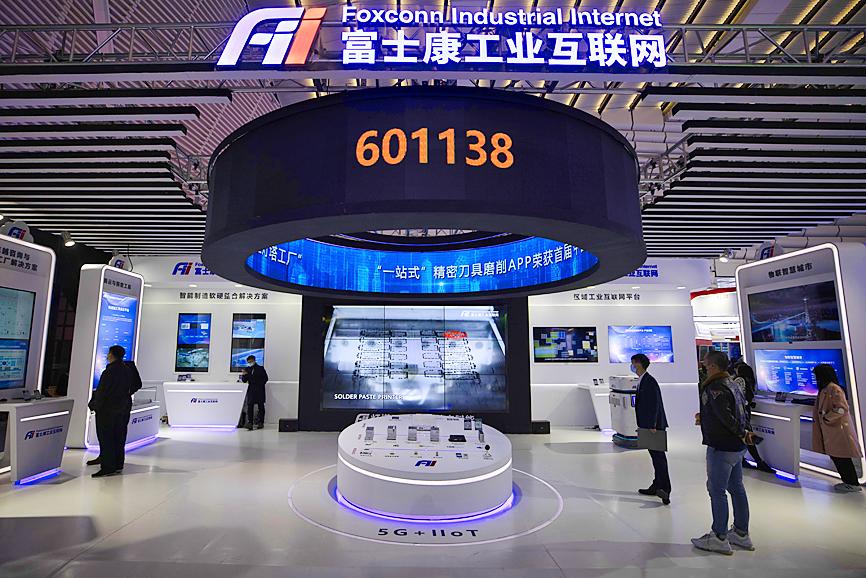Foxconn Industrial Internet Co Ltd (FII, 富士康工業互聯網) has invested 9.8 billion yuan (US$1.46 billion) in state-backed Chinese chip company Tsinghua Unigroup (紫光集團) through a private equity fund.
The Shanghai-listed server and networking devices firm, which is 85 percent owned by Hon Hai Precision Industry Co (鴻海精密), is planning to invest in the semiconductor industry. It now holds a 15 percent stake in Tsinghua Unigroup through the newly formed Xingwei (Guangzhou) Industrial Investment Partnership Ltd (興微廣州產業投資) fund.
Created in March along with Beijing Zhilu Asset Management Co (北京智路資產管理), the fund is one of 10 equity funds comprising Beijing Zhiguangxin Holding Co (北京智廣芯控股).

Photo: EPA-EFE
Beijing Zhiguangxin now owns 100 percent of Tsinghua Unigroup after injecting 54.9 billion yuan into the cash-strapped chipmaker, the corporate registration of the firm showed on Monday.
Tsinghua Unigroup said it has completed its reorganization plan and emerged from bankruptcy.
“FII is an independent company, listed on the Chinese stock market. The company raised capital in China and used the proceeds to invest in third-party private equity funds, with an aim to explore new technologies and investment targets to fuel the company’s future expansion,” the Hon Hai subsidiary said in a statement.
Tsinghua Unigroup is China’s largest chip company, counting memorychip maker Yangtze Memory Technologies Co (長江存儲) and mobile phone chipmaker Unisoc (Shanghai) Technologies Co (紫光展銳) as major semiconductor subsidiaries.
The transaction requires approval from the Investment Commission, as sensitive technologies are involved, the commission yesterday told the Taipei Times.
Technologies linked to foundry, chip design, testing and packaging are considered sensitive, a commission official said, adding that the deal also requires a technology review conducted by a special task force, as the investment is above US$500 million.
FII last month acquired four chip testing and packaging facilities in China’s Kunshan from ASE Technology Holding Co (日月光投控) through a Chinese private equity fund for an unspecified sum.
Apple Inc started to test sample NAND flash storage made by Yangtze Memory this year, as the US company is considering new sources of memory chips for iPhones to limit supply disruptions, Bloomberg News has reported.
New Unigroup chairman Li Bin (李濱) yesterday said the company is seeking to expand beyond chips to sectors such as genetics and artificial intelligence.
“History has proven that all scientific development and national prosperity depends, among other things, on realizing where one is ignorant,” Li wrote in a memo to employees. “And then it’s the ability to remain curious, endlessly explore and learn, and seek progress.”
Additional reporting by Bloomberg

Sweeping policy changes under US Secretary of Health and Human Services Robert F. Kennedy Jr are having a chilling effect on vaccine makers as anti-vaccine rhetoric has turned into concrete changes in inoculation schedules and recommendations, investors and executives said. The administration of US President Donald Trump has in the past year upended vaccine recommendations, with the country last month ending its longstanding guidance that all children receive inoculations against flu, hepatitis A and other diseases. The unprecedented changes have led to diminished vaccine usage, hurt the investment case for some biotechs, and created a drag that would likely dent revenues and

Macronix International Co (旺宏), the world’s biggest NOR flash memory supplier, yesterday said it would spend NT$22 billion (US$699.1 million) on capacity expansion this year to increase its production of mid-to-low-density memory chips as the world’s major memorychip suppliers are phasing out the market. The company said its planned capital expenditures are about 11 times higher than the NT$1.8 billion it spent on new facilities and equipment last year. A majority of this year’s outlay would be allocated to step up capacity of multi-level cell (MLC) NAND flash memory chips, which are used in embedded multimedia cards (eMMC), a managed

CULPRITS: Factors that affected the slip included falling global crude oil prices, wait-and-see consumer attitudes due to US tariffs and a different Lunar New Year holiday schedule Taiwan’s retail sales ended a nine-year growth streak last year, slipping 0.2 percent from a year earlier as uncertainty over US tariff policies affected demand for durable goods, data released on Friday by the Ministry of Economic Affairs showed. Last year’s retail sales totaled NT$4.84 trillion (US$153.27 billion), down about NT$9.5 billion, or 0.2 percent, from 2024. Despite the decline, the figure was still the second-highest annual sales total on record. Ministry statistics department deputy head Chen Yu-fang (陳玉芳) said sales of cars, motorcycles and related products, which accounted for 17.4 percent of total retail rales last year, fell NT$68.1 billion, or

In the wake of strong global demand for AI applications, Taiwan’s export-oriented economy accelerated with the composite index of economic indicators flashing the first “red” light in December for one year, indicating the economy is in booming mode, the National Development Council (NDC) said yesterday. Moreover, the index of leading indicators, which gauges the potential state of the economy over the next six months, also moved higher in December amid growing optimism over the outlook, the NDC said. In December, the index of economic indicators rose one point from a month earlier to 38, at the lower end of the “red” light.